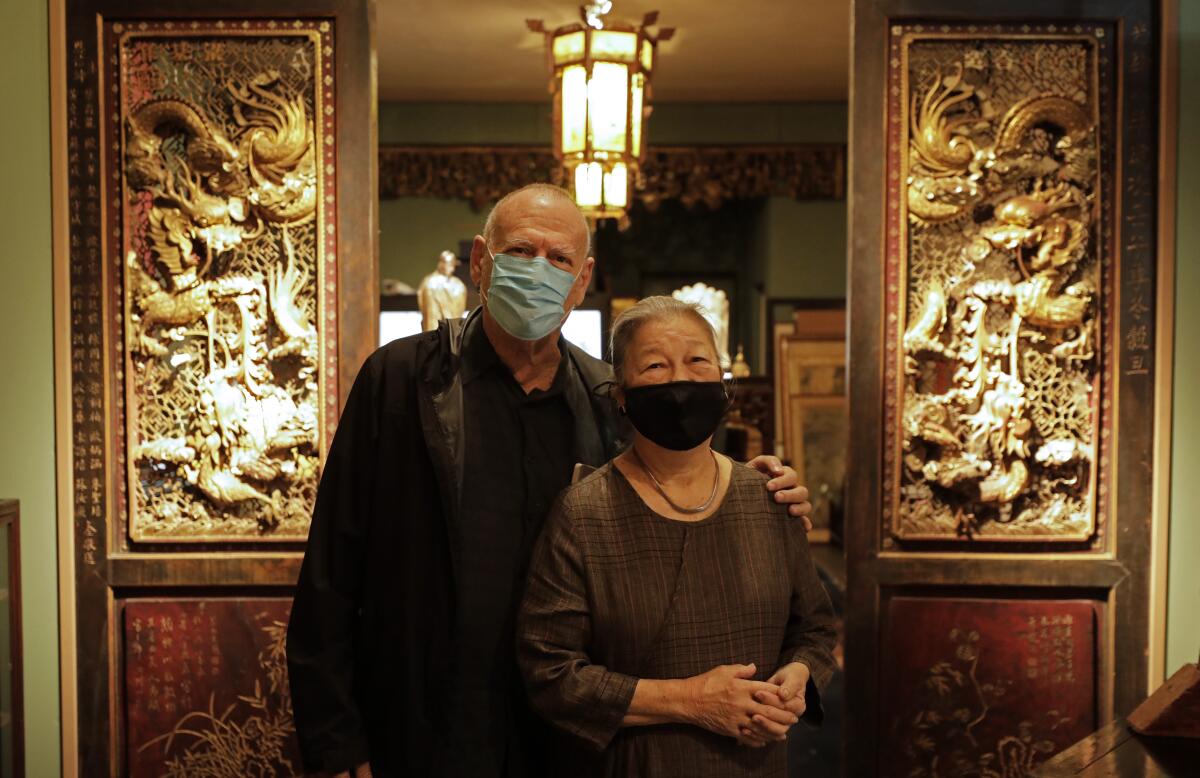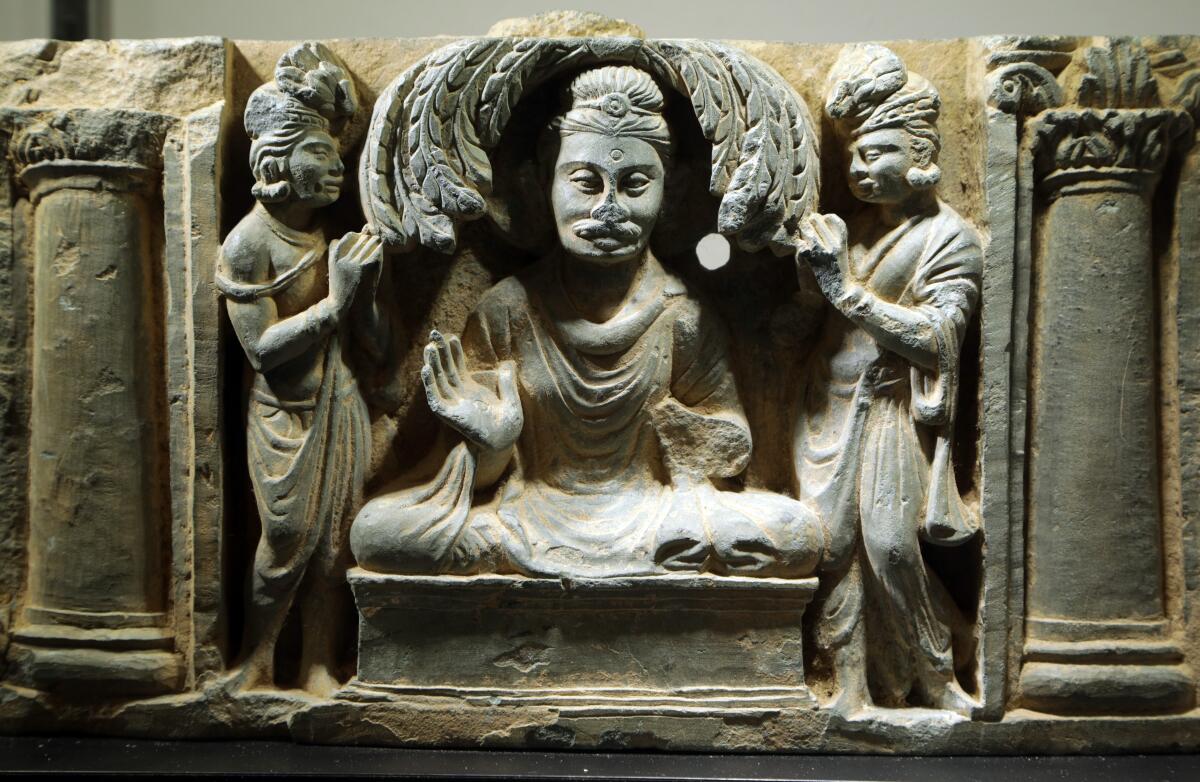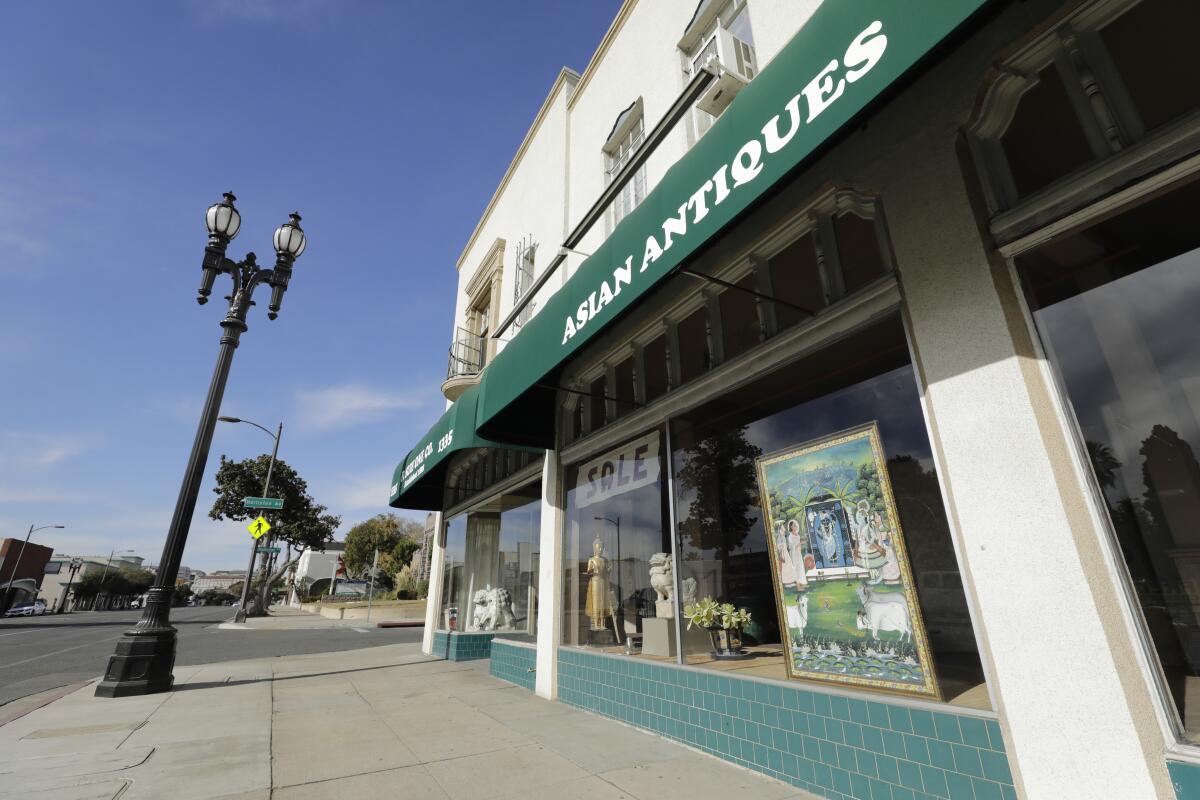Founded in 1888, this Asian antiques shop hopes to put 2020 in the past

- Share via
Time feels abstract at F. Suie One Co., one of the oldest Asian antique stores in the United States.
A Cambodian 15th century wooden Buddha stands near kitschy 1960s Chinese alarm clocks with the face of Mao Zedong. A carved stone Rakshasa head from 9th century Indonesia stares into a room where a Chinese ceramic horseman from around 200 B.C. is on display. A 1930s rickshaw is parked near the front door on Colorado Boulevard in Pasadena.
For owner Leslee Leong, whose immigrant grandfather established the business in 1888, it always seemed as if F. Suie One would, like its wares, withstand the test of time.
“We had periods of great feast and periods of great famine,” Leong said her mother told her. “She said we just rode through them all. Sometimes the economy was good. Sometimes the economy went down. ... We kept going.”
But this is 2020. And in this pandemic year that has been especially cruel to small businesses, Leong, 75, is contemplating something that always seemed unimaginable: the end.
“I try not to think about it,” added Joe Schulman, her 78-year-old husband.
Even for a place as storied as F. Suie One — run by the family that author Lisa See (Leong’s cousin) chronicled in the 1995 bestselling memoir “On Gold Mountain: The One-Hundred-Year Odyssey of a Chinese-American Family” — this year has been brutal.
“It is somewhat astounding that a family-owned business is still operating anywhere after 132 years,” said Paul Little, chief executive of the Pasadena Chamber of Commerce. “That is a tribute to the dedication, hard work and ingenuity of the family, their expertise and the dedication to their customers.”
This year, Leong gave the Huntington Library, Art Museum and Botanical Gardens a collection of the family’s papers and photographs, as well as business records and other materials from F. Suie One.
“Chinese American history has been neglected for a very, very long time,” said Li Wei Yang, curator of Pacific Rim Collections at the Huntington. He said walking into F. Suie One is like “walking into living history, like a museum.”
But these days, he said, it’s difficult to get people interested in Asian antiques. The trade is now dominated by big auction houses.
“Small family stores like this, it’s harder for them to survive,” Yang said. “It would be a tremendous loss if F. Suie One were to close its doors someday.”
Businesses all along famed Colorado Boulevard, part of Route 66, have closed in recent months. With coronavirus cases and deaths soaring in the midst of the holiday shopping season, nonessential retail stores throughout most of California are now limited to 20% of capacity, and health officials are pleading with a weary public to stay home.
Little says he worries especially for locally owned businesses that are struggling to navigate ever-changing health restrictions and have used up what little local, state and federal assistance they received as the pandemic stretches into its ninth month. Distraught store owners call him about every week, asking: “What am I supposed to do? How am I supposed to keep going?”
Deemed nonessential early in the pandemic, F. Suie One closed for several weeks this spring before reopening by appointment only.
A $10,000 disaster relief grant for struggling small businesses from the city of Pasadena helped purchase personal protective equipment and to build the first website for the 132-year-old company, which relied almost entirely on word-of-mouth and people who happened to walk by.

“Our daughter said we were hopelessly outdated,” Leong noted.
But the days without a sale stretched into weeks. Even after the store reopened to in-person shopping, customers have been few.
“Once the pandemic started, it was next to no business,” Schulman said.
Still, buying antiques, Leong said, is addicting, and “collectors can only hold out for so long.” Customers started trickling back in around October, when, the couple said, people just seemed to be tired of staying at home.
As they spoke with the front door open to improve ventilation, cars rushed by on Colorado Boulevard. Coronavirus numbers may be skyrocketing, Schulman said, but you’d never know it by looking outside.
“This is a shutdown, right? When they originally shut down, there was like one car passing every three minutes,” he said. “Now, look at the traffic. It was just fatigue of staying home. Fatigue of not buying. We got some business.”
But it is a fraction of what it once was. So, Leong and Schulman started putting more items up for auction. Some pieces that have been in the family for generations are now for sale.
“It took us a hundred years to decide to sell this,” Leong said, motioning toward an enormous, intricately carved wooden bed from 19th century China. But it’s time, she said, “to be realistic” about the future.
F. Suie One was started by Leong’s grandfather, Fong See, a Chinese immigrant who came to the U.S. at age 14 in 1871. Twelve years later, the U.S. passed the federal Chinese Exclusion Act of 1882 that barred Chinese immigration.
In Sacramento, a young See made a name for himself by selling crotchless underwear made from Chinese silk to brothels.
“He would have fancy underwear made for ladies,” Leong said, laughing. “Very fancy underwear,” she said, for “fancy white ladies.”
See eventually hired Letticie “Ticie” Pruett as a saleswoman. Leong said her grandmother, a white woman, could talk to the female customers in a way that, “as a Chinese gentleman, he could not.”
See and Pruett, who each had a sharp mind for business, quickly fell in love. But interracial marriage was illegal in California. So, in 1897, they had a lawyer draw up a social contract between the two to formalize the union.
Pruett encouraged her husband to expand the lingerie business and start selling antiques. They moved to a burgeoning Los Angeles and set up shop. They ran several branches throughout the Southland.
Regular customers at F. Suie One, Leong said, included Frank Lloyd Wright, the famed interior designer Tony Duquette, and Hollywood filmmakers who used the store’s wares to build movie sets that looked like China.

F. Suie One moved to its current location, a two-story building with green awnings on East Colorado Boulevard near Pasadena City College, in the early 1980s. The rooms are a warren of art, furniture and collectibles; a drafty warehouse in the back is stuffed floor to ceiling with things that don’t fit up front.
Schulman, a writer and cinematographer who collected Asian art, first walked through the front door in 1994. Leong — then a single mother of two young children who was running the business alone — promptly pushed him out in the middle of the day. She had to close the store so she could pick up her daughter.
Schulman came back. They hit it off.
“I was looking to buy antiques ...” he said.
”...of which I was not one,” she teased. “He’s going to try and say I was an antique.”
“I wouldn’t dare.”
They married in 1999. After describing how they met, they high-fived.
The septuagenarians realize they are getting older and that their children, who have their own successful careers, won’t be taking over the store, where a painting of See, a man who lived to see his 100th birthday, still hangs in the front room.
“We don’t have any plans of retiring,” Schulman said. “We love to do this. But we won’t live forever.”
More to Read
Sign up for Essential California
The most important California stories and recommendations in your inbox every morning.
You may occasionally receive promotional content from the Los Angeles Times.














